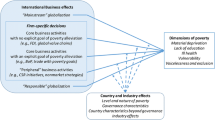Abstract
As key players in globalization, international businesses have interconnected the wealthy and impoverished areas of the world. An increasing number of firms from industrialized areas are engaged in the two-thirds world, to extract valued minerals and petroleum, to manufacture goods, to purchase products and produce from local suppliers, and to sell consumer products and services. The results have been ambiguous; in many cases, low-income people in the two-thirds world now live somewhat less impoverished lives. A positive outcome, however, is not automatic. In other settings, international businesses operations have aggravated the poverty of the poor. Either way, business operations merit close examination. Industrialized countries invest far more wealth in developing areas through business connections than through aid programmes. It therefore matters a great deal what kinds of practices international businesses follow.
Access this chapter
Tax calculation will be finalised at checkout
Purchases are for personal use only
Preview
Unable to display preview. Download preview PDF.
Similar content being viewed by others
References
AccountAbility/BWB (2003): AccountAbility and Business for Social Responsibility with Brody Weiser Burns Business and Economic Development: The Impact of Corporate Responsibility Standards and Practices. http://www.economicfootprint.org
Auty, R. M. (1993) Sustaining Development in Mineral Economies: The Resource Curse Thesis (London: Routledge).
Chossodovsky, M. (1997) The Globalization of Poverty: Impacts of the IMF and World Bank Reforms (London: Zed Books).
Chua, A. (2003) World on Fire: How the Exportation of Free Market Democracy Breeds Ethnic and Global Instability (New York: Doubleday).
Forstater, M., MacDonald, J. and Raynard, P. (2002) Business and Poverty: Bridging the Gap (London: Prince of Wales International Business Leaders Forum).
The Group of Lisbon (1995) Limits to Competition (Cambridge, MA: MIT Press).
Klein, N. (2000) No Logo (London: Flamingo).
Legrain, P. (2003) Open World: The Truth About Globalization (London: Abacus).
Litvin, D. (2003) Empires of Profit: Commerce, Conquest, and Corporate Responsibility (New York: Texere).
Oxfam International (2002) Rigged Rules and Double Standards: Trade, Globalization, and the Fight Against Poverty (Washington, DC: Oxfam).
Prahalad, C. K. and Hart, S. L. (2002) ‘The Future at the Bottom of The Pyramid’, Strategy + Business Magazine, First Quarter.
Ross, M. (2001) Extractive Sectors and the Poor: An Oxfam America Report (Washington: Oxfam America). http://www.oxfamamerica.org/pds/eireport.pdf
Stiglitz, J. E. (2002) Globalization and its Discontents (New York: W. W. Norton).
Editor information
Editors and Affiliations
Copyright information
© 2004 Frederick Bird and Stewart W. Herman
About this chapter
Cite this chapter
Bird, F., Herman, S.W. (2004). Introduction. In: Bird, F., Herman, S.W. (eds) International Businesses and the Challenges of Poverty in the Developing World. Palgrave Macmillan, London. https://doi.org/10.1057/9780230522503_1
Download citation
DOI: https://doi.org/10.1057/9780230522503_1
Publisher Name: Palgrave Macmillan, London
Print ISBN: 978-1-349-51533-2
Online ISBN: 978-0-230-52250-3
eBook Packages: Palgrave Business & Management CollectionBusiness and Management (R0)




